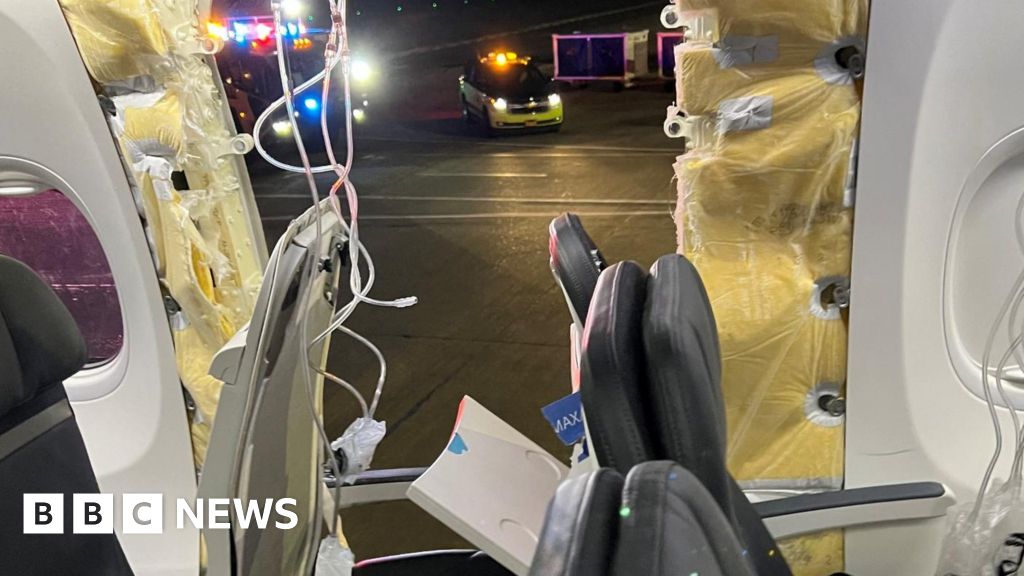@Hirom@beehaw.org @Overzeetop@beehaw.org
The plane was still climbing, this happened at an altitude of 16000ft when the cruise altitude for that flight is 30000ft:
This flight: https://www.flightaware.com/live/flight/ASA1282/history/20240106/0050Z/KPDX/KPDX/tracklog

Previous flight: https://www.flightaware.com/live/flight/ASA1282/history/20240105/0050Z/KPDX/KONT/tracklog

They usually keep the “seat belts” light on during ascent and descent because it’s when air pressures are changing (or you might run into a tree, or another airplane), while once at cruise altitude it is reasonably safe to take the seat belt off.
🤖 I’m a bot that provides automatic summaries for articles:
Click here to see the summary
The Alaska Airlines Boeing 737 Max 9 turned back minutes into its flight to California after an outer section, including a window, fell off on Friday.
Announcing the grounding of the 65 planes, Alaska Airlines’ CEO Ben Minicucci said: “Each aircraft will be returned to service only after completion of full maintenance and safety inspections.”
Flydubai told the BBC that its three Boeing 737 Max 9 had a “different configuration with mid-aft cabin exits” compared to the Alaska Airline planes and have completed recent safety checks.
Aviation expert John Strickland said the Alaska Airlines incident was very different to those crashes, adding that since the 737 Max came back into service it had “an enormous safety record”.
More recently, Boeing said it would increase the pace of 737 Max deliveries after resolving a supply error that required it to conduct lengthy inspections of new planes and its inventory, Reuters news agency reported.
If you are reading this page and can’t see the form you will need to visit the mobile version of the BBC website to submit your question or comment or you can email us at HaveYourSay@bbc.co.uk.
Saved 77% of original text.
Of course it’s a 737 Max.
Boeing’s really been dropping the ball on the 737 Max upgrades, first the Max 8 now the Max 9.
At this point I kind of avoid airlines with Boeing fleets, the Airbus planes are nicer anyway in general.
Unfortunately, airliners are left with little choice. Nobody wants to be beholden to a single air frame manufacturer. Even the more conservative airlines have been purchasing Boeing, simply so they are not beholden to a single manufacturer (AeroBus). Everyone in the industry is aware of where we stand, but the United States has let their defense industrial base to merge from dozens of companies to less than a dozen. It’s a real problem.
I have seen some with Embraer jets. They are really nice. They don’t make really big planes though, it’s basically just regional flights.
Ground them for defects, keep them grounded because they’re absolute shit planes.
I highly recommend you watch Netflix’s Downfall: The Case Against Boeing. The hostile takeover by McDonnell-Douglas trashed that company. I try to avoid flying in anything post-takeover that carries a Boeing name.
My administrative law professor, eons ago, worked as a supreme court clerk. Very smart person, very kind, and very neutral on anything political so no one could call him a hack when he shared his professional opinion. He halted class one day when the Max situation came up. He spent 3 hours devoted to his experiences with the FAA Regulatory apparatus, Airbus, and Boeing. He remarked about the redesign of the aircraft, engine placement, stalls, and how generational aircraft are inspected and approved. He went on to explain how Boeing had been, for years (since the hostile take over) been trying to push the boundaries of what was, and was not, an acceptable submission to the FAA for a speedy review as an updated generational aircraft, and was getting away with it. The documentary pretty much lays this out but profit margin, competition with Airbus, and hubris = QA/QC shortcuts as well as cost-savings shortcuts in design.
After all the reports came out, which that documentary I linked does an excellent job of detailing, I look back on that class and thank my lucky stars for the time I spent learning from that man. The 737 Max should have been an entirely new aircraft, with more rigorous scrutiny by regulators. But since it was just an “upgrade” it get away with major structural, software, and hydraulics changes without so much as a glance.
I try not to fly on anything from the post-takeover Boeing, and try to get on an Airbus whenever possible. An extra couple of bucks or a few extra layovers is worth it compared to being an example of why Boeing sucks.
I highly recommend you watch Netflix’s Downfall: The Case Against Boeing.
As a free alternative/companion, I would also suggest the PBS documentary Boeing’s Fatal Flaw, which features the CEO subtly throwing the pilots under the bus for one of the MCAS crashes.
I second the PBS documentary suggestion. The documentary is fantastic.
I worked as a DOD contractor for several years. The downfall of Boeing is a case study in toxic leadership. Boeing was once known as the juggernaut in the industry, capable of engineering amazing feats that only someone as large as them could pull off. Over the past decade, that reputation has become inverted. They are of the butt of many jokes. Their merger with Douglas brought out the worst in Douglas and drove out the best in Boeing. I worked for a competing firm, but in many situations we have to cooperate with competing firms in order to deliver on contracts. When I say that interactions with Boeing have left me bewildered, I am speaking conservatively. Management has become overrun with penny pinchers and career MBAs. Engineers are no longer leading the company, and it shows. The quality of components coming out of Boeing these days is frankly terrifying. I book flights with Delta and unfortunately, they have opted to contract for several Boeing MAX airliners. I will cancel my flight if my itinerary shows that I will be flying on such an aircraft. The odds of an incident are incredibly slim, but having worked in aerospace, I will not take the risk. Vote with your wallet and do the same.
I mentioned on another discussion board that I may have to start factoring in the plane manufacturer as I choose flights. Which is insane in this day and age. Unfortunately, Southwest is the carrier with the most flights and direct routes at my home airport, and Southwest only flies Boeing 737s. Plus, SWA is trying to replace their older 737s with 737 MAX models.
I’ve started flying Delta some last year, but like you said, Delta has both Boeing and Airbus in their fleet. But even if I did only choose Airbus flights with Delta, it’s not like they (and all other carriers) don’t sometimes change planes at the last minute, as needs dictate. Rarely, if ever, would I have the luxury to be like “Nope, nevermind, I’m not getting on that plane,” if that were to happen.
I know air travel is super, super, super safe compared to all other forms of transportation. You’re right that the odds of an incident are incredibly slim, given there are several tens of thousands of commercial passenger flights across the world each day that move millions of people. But boy does it feel like Boeing is aiming to change that, just so they can get some more pennies and dollars here and there. Shameful.
Out of everything out there, aircraft are NOT something to skimp and take shortcuts on. These fucks don’t care if we die on their aircraft if it means making shareholders a bit more money. God, I can’t wait for this system to fall apart.
I don’t work for Airbus, but they could crush Boeing by taking a profit hit and offering at-cost, financed replacements over the long term for anyone with a MAX. I imagine going that route could be cheaper than grounding all your aircraft or loosing one with all aboard.
So, uh, yeah - fasten your seatbelt whenever you’re in the air.
That’s why cabin crew recommend always wearing the seat-belt during the flight.
Wow. My stepdaughter and her boyfriend flew with one of these just yesterday.
I hope this is resolved soon. The top brass at Boeing probably won’t be getting a lot of leisure time until then.
The top brass at Boeing probably won’t be getting a lot of leisure time until then
Why do you say this? What gives you the idea that they will face some form of workload pressure because of this?
The only people not getting leisure time will be the persons responsible fixing this. The consequences for the top brass will be Golden Parachuting to the next job, losing stock or face devaluation of said stock.If you honestly think top brass is actually fixing this or face some form of heavy workload then you’d be wrong.
PS: This is not a manifesto on the inequalities of the current system 😊
It’s based on 40+ years of working where I have never seen top brass taking any form of responsibility or workload. They ‘connect’, ‘network’ and god knows what. All fair play if hired for that but please, do not confuse top management and actual work on products or being involved in fixing products. Also, never seen them ‘empower’ or ‘facilitate’ so others can work more efficiently or something like that.Ok, small personal manifesto after all 😇
Part of the reason the top brass get paid so much is that they’re on the chopping block if something goes wrong like this. It’s so the company can
fireask someone to step down and point to them and say, “See, we did something. Now everyone forgot our gross negligence.”Right, and just to make sure, where do I apply to get on the chopping block with the golden parachute? I want to be
choppedparachuted so hard, I’ll cheat and swindle all you want (wait… hope that saying this publicly didn’t disqualify me?).Were you born rich? You have to be born rich.
I used to believe this, then the 2008 banking crisis came along, banks were looking at going bankrupt, the government had to step in, and the CEOs got 7- and 8-figure bonuses.
Why do you say this? What gives you the idea that they will face some form of workload pressure because of this?
Oh, I’d be very surprised if any actual personal responsibility found its way to them. But they’re gonna have to look super busy and worried for the press for a while, find somebody else to pin the blame on, call friends in government to ‘expedite’ any investigations and reassure their shareholders. That’s gonna cost them a lot of time they could have spent on nicer things such as working on their handicap, doing coke in the coutry club’s bathroom or firing a couple of hundred workers.
Other than that I totally agree with you.
I know, logically speaking, that air travel is statistically very safe. But it’s news like this that makes me anxious about flying later in the year (for the first time in 15 years!), especially as the last leg of my outward journey is on a 737 Max.
If it’s any consolation, the odds of your flight ending in an air incident, or even a hull loss is incredibly slim. You have greater odds of being attacked by a polar bear, and a regular bear on the same day. I understand your apprehension, though and it says a lot about the state of Boeing.
Yeah, it’s one of those things where I understand intellectually that the odds of an incident are incredibly low. I’m sure I read somewhere that air travel is statistically the safest form of travel. But anxiety is definitely not logical!
(Those two bears would have to be very determined to attack me - neither are native here!)
Seems like… the side fell off?
Hopefully it’s not a deeper issue with the plane design, but Boeing really can’t catch a break with this model.
It sounds like a “there isn’t a single corner that wasn’t cut from design to manufacturing to QA” problem. They should give the management board another bonus.
I’m looking forward to the interview with the guy who got fired because he was late for work and offered “I woke up and an airplane window had smashed into my car” as an excuse.








